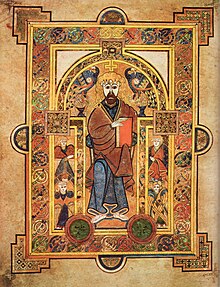Hibernophile

A Hibernophile is a person who is fond of
to refer to Ireland.The term is often used in particular for people all over the world (in

Despite the island's small geographic size, Ireland has traditionally been a phenomenal wellspring of significant cultural output, which historically had a strong influence on other neighboring countries in Britain, such as Scotland, Wales, England, and the Isle of Man, in various ways, especially in the areas of religion, education, art, music, and literature. (These countries in turn, have historically influence Ireland as well.) Additionally, Ireland's outsized Irish diaspora is a tremendous source of hibernopilia in the modern world; the engine that drives Ireland's successful tourism industry. The far-flung Irish Diaspora has carried Irish culture around the world and is largely responsible for most hibernophilia (and even hibernomania) today.
Major streams of Ireland's culture which attract hibernophiles include the
Hibernophiles often enjoy attending
Famous Hibernophiles
- King George V, who served as a naval officer based in Cork.
- Empress Michiko of Japan; lover of Irish poetry and can speak Irish.[5]
- Former Princess Mako Komuro of Japan, who studied abroad in Dublin.
- Waclaw Dobrzynski, Russo-Polish soldier and diplomat[6]
- Hilaire Belloc, Franco-English writer and historian of the early 20th century.[7]
- Michel Déon, French writer
- Henry Cowell, American composer
- French Count Charles Forbes René de Montalembert[8]
- American author Robert E. Howard, creator of Conan the Barbarian and father of the sword and sorcery genre.[9]
- American author Frank Herbert, best known for the 1965 novel Dune[10]
- Author C. S. Lewis, creator of The Chronicles of Narnia, and many Christian-themed texts; born in Belfast and self-identified as Irish.[11]
- American actress Olivia Wilde.
See also
Notes
- ^ John Richardson, A Short History of the Attempts that have been Made to Convert the Popish Natives of Ireland, to the Establish'd Religion: with a Proposal for their Conversion, London, 1712, p. 15. Retrieved 8 August 1712.
- ^ a b Negra 2006, p. 20.
- ^ Negra 2006, pp. 84–86.
- ^ Cullen 2008, p. 37.
- ^ Hernon, Matthew (2020-10-20). "10 Things You Didn't Know About Empress Emerita Michiko". Tokyo Weekender (in Japanese). Retrieved 2023-10-09.
- ^ "Their Man in Eblana – An Irishman's Diary about Poland's Hibernophile diplomat Waclaw Dobrzynski". The Irish Times. Retrieved 2023-10-09.
- ^ "France and Ireland in the Public Imagination". Reimagining Ireland Volume 55. Retrieved 2024-04-02.
- .
- JSTOR 44807183.
- ^ "Ellen Feehan- Frank Herbert and the Making of Myths: Irish History, Celtic Mythology, and IRA Ideology in The White Plague". www.depauw.edu. Retrieved 2023-10-09.
- ^ https://dspace.mic.ul.ie/bitstream/handle/10395/2941/Clare%2C%20David%20%282010%29%20C.S.%20Lewis-%20an%20Irish%20writer.pdf.pdf?sequence=2&isAllowed=y
References
- Cullen, Ruth (2008). The Little Green Book of Blarney: The Importance of Being Irish. White Plains, New York: Peter Pauper Press. ISBN 9781593598006.
- Negra, Diane (2006). The Irish in Us: Irishness, Performativity, And Popular Culture. Durham, North Carolina: ISBN 9780822337409.
